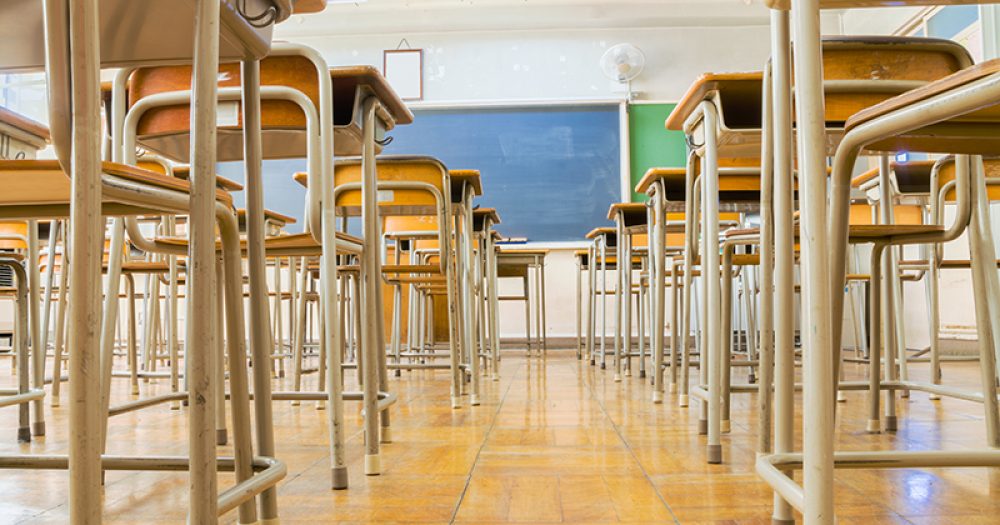Ofqual has revealed how pupils will be assessed for GCSE and A-level qualifications this summer, following the cancellation of exams.
The exams regulator has published guidance for schools, along with separate guidance for teachers and a letter to pupils.
Here’s our explainer on how it will all work…
1. Schools must provide a grade and rank for each pupil in each subject
Schools are being asked to provide a centre-assessment grade for each pupil.
This will be the grade that each pupil is most likely to have achieved if they had sat their exams, and will be based on evidence held by schools and reviewed by subject teachers and heads of department.
Schools will also have to provide a rank order of pupils within each grade.
This is because the statistical standardisation process will “require a more granular scale” than grades alone, Ofqual says.
If a school had 15 pupils for GCSE maths with a centre assessment grade of 5, they should be ranked from 1 to 15, where 1 is the “most secure/highest attaining”, 2 is the next most secure, and so on.
Ofqual has said schools won’t need to send this data to exam boards any earlier than May 29, giving them at least eight weeks to collect it.
They expect results will be available no later than the usual dates in August, but potentially earlier.
2. Pupils should not be set extra work
Ofqual said it recognises that, given the timing of the announcement, schools may have “incomplete evidence”.
However, the regulator is adamant that judgments should be made “on the evidence that is available”.
This means there is “no requirement” to set additional mock exams or homework tasks to help determine grades, and Ofqual states that “no student should be disadvantaged if they are unable to complete any work set after schools were closed”.
Where additional work has been completed since schools closed on March 20, heads should exercise caution where that evidence suggests a change in performance.
There is also no requirement to send any supporting evidence to exam boards, though schools should retain records of this in case exam boards ask about the data.
Schools should also not ask pupils to complete any non-exam assessment work, and marks do not need to be submitted for this.
3. This is what grades should be based on
Ofqual says judgments must be objective and based only on evidence of pupil performance, including…
- Records such as progress review data, classwork, bookwork and participation in performances in subjects like music, drama and PE
- Performance in non-exam assessment, even if not fully completed
- Previous grades (for re-sitting pupils)
- AS-levels (for A-level pupils who took an AS)
- Performance in class or homework assessments, and mock exams
- Tier of entry (in tiered subjects)
- Previous results of the school in the subject
- Performance of this year’s pupils compared to those in previous years
- Any other relevant information
4. So what role will exam boards play?
Exam boards will use a statistical model being developed by Ofqual to standardise grades across centres in each subject.
The model will combine a range of evidence, including expected grade distributions at national level, schools’ results in previous years and the prior attainment of pupils at school level.
Importantly, the process will not change the rank order of pupils within schools, and won’t assume that the distribution of grades in each subject or school should be the same.
However, if schools’ judgments are found to be more generous or severe than others, final grades for some or all pupils will be adjusted down or up (meaning those pupils at either end of the rankings per grade are most likely to move up or down).
“We will do this to align the judgements across centres, so that, as far as possible, your students are not unfairly advantaged or disadvantaged this summer,” Ofqual said.
Ofqual is optimistic it won’t see any deliberate inflation of results, but aren’t naive that some schools may inflate grades. However they are confident the standardisation process will be able to level that out.
5. What about home-schooled and other private candidates?
Some schools will have accepted entries from private candidates, for example, those who have been home-schooled, or are following distance learning programmes.
These pupils should be included in the centre assessment process where the head of centre is “confident that they and their staff have seen sufficient evidence of the student’s achievement to make an objective judgement”.
However, pupils who do not have an existing relationship with a school “may instead need to take exams in the autumn to get their grades”.
Ofqual said it is “urgently exploring whether there are alternative options for those students”.
6. Ofqual will consult on excluding year 10s
Schools will only be able to submit grades for pupils in year 11 and above, including those taking A-levels in year 12.
Ofqual is proposing that grades are not issued for pupils in year 10 or below, and that schools should withdraw any entries for them. A consultation on this proposal will be launched “shortly”.
“We realise that, if the final decision is to exclude year 10 and below students, this will be disappointing for those students, but our objective in awarding grades based on teachers’ judgments is primarily to allow students to progress to the next stage of their education, or to employment or training.
“Students in year 10 and below will have the opportunity to sit exams in future exam series. We will make a final decision and provide further information before any data needs to be submitted to the exam boards.”
7. Don’t share your grades with pupils
Schools must not “under any circumstances” share assessment grades or rank orders with pupils, their parents or carers, or “any other individuals outside the centre” before final results have been issued.
According to Ofqual, this will protect the “integrity” of teachers’ judgments, and will avoid school leaders and staff being “put under pressure by students and parents, to submit a grade that is not supported by the evidence”.
Schools are being reminded that although pupils are allowed to request their personal data under GDPR, exam marks and other information used to determine results are exempt from disclosure under paragraph 25(2) of the Data Protection Act.
8. Grounds for appeal will be ‘narrow’
Ofqual says the normal arrangements for reviews of marking and appears “will not apply” this year.
The regulator is considering what arrangements might be put in place “to allow an effective appeal”, and says it will consult on proposals “shortly”
“Centres should expect the possible grounds of appeals to be relatively narrow and based on application of the process. In submitting data to exam boards, centres should make sure that it is correct.”
Pupils who feel their summer grades do not reflect their ability will be given the opportunity to take exams, either in autumn or next summer. If they choose to do this, “both grades will stand”, Ofqual said.
9. Take disabilities and personal circumstances into account
Where disabled pupils who have had reasonable adjustments agreed (for example, the use of a reader or scribe), or where other pupils have agreed access arrangements, schools’ judgments should take account of “likely achievement with the reasonable adjustment/access arrangement in place”.
However, special consideration requests, in the event that a pupil is unable to take an assessment or suffers a traumatic event that might affect their performance, “will not apply this summer”.
Instead, judgments “should reflect how the students would have performed under ordinary circumstances”.
“Where illness or other personal circumstances might have affected performance in mock exams, centres should bear that in mind when making their judgments.”








My daughter hasn’t done well at school recently due to suffering from a severe lack of confidence but she has worked really hard leading up to her GCSE’s in order to do well in her exams and achieve good grades. If she is judged on previous grades and not how far she has come, her life chances are ruined.
If this turns out to be the case, I will sue her school and Ofcom.
I feel the same my son rises to the occasion for end of year exams.. if school decide to rank him low or give a forecast grade then that will be devastating. He recently jumped 2-3 grades in his mocks I believe he would have done so much better if their was consistency and if exams took place.
You make a good point. I’m a journalist writing an article for the Guardian’s education page and I’d like to use what you say. Could we speak? Liz Lightfoot lizlightfoot@blueyonder.co.uk
My son left school last year. His grades that he achieved from his mock exams were very low in his maths and English. Through sheer hard work and determination my son took every opportunity to stay behind for every extra lesson that was available to him throughout March until his gcses exams started. He was getting grades of 2 and 3 in his maths and came out with a level 8. His teacher was overwhelmed at how well he did . He also passed his English coming out with a 8. I personally think that he would of failed his maths and English if they had gone on the grades he did in his mock exams ! I feel sorry for the children this year that can’t get the extra help they deserve.
You make a good point. I’m writing an article for The Guardian about the teacher assessed grades this year. I’d like to make your point. Could we speak? Liz Lightfoot lizlightfoot@blueyonder.co.uk
What happens to year 12 students
As A levels’s are two year course ??
My son is doing his A level’s they are hard enough today feel for the young people of today trying to better them selves with their education might go into uni too
Thank you
My son is homeschool in KSA grade12 he achieve star in 8subject of olevel and get B in albiology so he is studying very hard to bring star but I am sorry for him. Now how will be assesed supposed to admit for colleges on august
I’m a bit worried of teachers grading because it may be a bit relevant to each teacher so feelings towards each student , it may be a bit unfair, also as for last year grades my son was doing his best to improve his grades so If last year will be taken into consideration it will be misguiding. Thanks
It is not fair that you differentiate between year 10 and year 11
Hope you consider the huge effort and money we spend with students to be fully qualified to the Final exam and it is not easy to repeat the same effort the next year or even the next exam sitting in November
Consider also that year 10 for some students is like a final stage as ny daughter registered for the exam in 4 subjects
She planned for the next year to have AS level in 2 subjects with only one O level to complete the university requirements
Also our school is dividing the O level subjects into 2 groups and completing 4 subjects in year 10 it means that the school will not repeat teaching these subjects in year 11
Hope you just consider also the additional private Lessons students take to raise theirs level beside the school classes
Finally, we hope all the best for You and everyone to cross this Coronavirus pandemic with no loss
its not right. i am a gcse student my grades are very low 2 or 3. but i didn’t feel like giving up because i know i can do better in summer. i was trying to put lots of efforts for my finals and taking help from teachers as much i could so i can try my best in summer. i was working really hard whole day and night but then our school shut and gcse was cancelled. i am really upset because my mock grades are really low. but then teachers told me that i can still re still in exam so i start to put more efforts and i knew i can do it. but today when i check i just realise i can take the exam in 2021 next year summer. i feel disappoint all my efforts were just waste of time. i’m really upset because my dreams which i have planned and all those efforts just went wasted. do you think its fair?
My daughter moved schools in yr 8 she was very unhappy in school and suffering emotionally with various peer groups. The new school suited her better she was so happy her grades went up even though on paper the school is under performing at G.C.S.E. Fast forward to yr 11 my daughter has some great predictions mainly 7’s and 8’s struggling with maths a little but she was still predicted a pass at grade 5 that said she was having extra private tution and was on track to exceed a 5 to a possible 6-7. She has a conditional offer to at a good 6th form but needs the grades predicted to follow her choosen path. I am concerned that with the current process of taking a schools historical performance will mean lower grades for my daughter. It doesn’t take into account the new leadership at the school and the vast amount of changes and money spent on online tutors that had put the school inline for their best results to date. When the cancellation of exams was announced it was stated that no child would be at a disavantage this is not true as my daughter will suffer because of the school she is in had she had stayed in her previous school she may not have had her grades changed. This is discriminating against children in poorly performing schools and I know in every school there are always star students but will they be the victims.